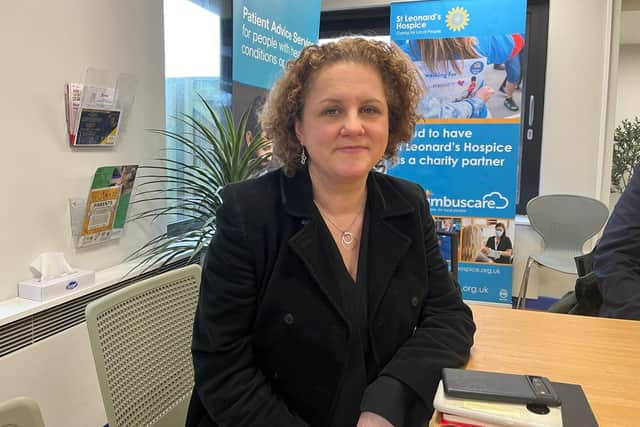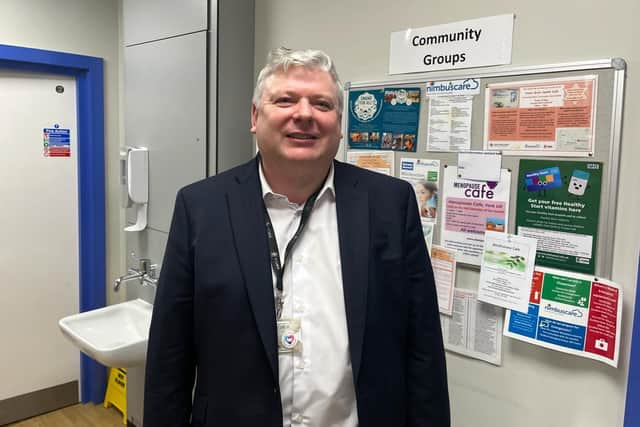City of York Council: 'The cost of adult social care is not sustainable'
The City of York Council is no different; 37p in every pound is spent on adults with social care needs.
Add children into the equation, it's more than half of the council’s budget.
Advertisement
Hide AdAdvertisement
Hide AdStandard residential care fees for learning-disabled adults in York can range from £700 per week to £5,600 per week for the most complex needs.


About 75 per cent of the residents the council funds cost around £1,500 per week.
A dementia placement paid for by the council costs £731 per week, while care home fees vary across the city and an approximate weekly average for self-funding residents is around £1,250.
“This is absolutely not sustainable unless the government wakes up to the crisis in adult social care,” Coun Jo Coles, executive member for health and adult social care, said at the City of York Council’s frailty hub.
Advertisement
Hide AdAdvertisement
Hide AdCoun Coles became a councillor for the first time in May 2023, when Labour won a majority in York for the first time since 2011.


As the key decision maker for health and adult social care, the options that have been laid out in front of her by council officers have been dire.
The council has had to use the maximum adult social care precept on council tax (2.0 per cent on top of the 2.99 per cent increase on the basic rate of council tax) as well as scrapping key services such as the use of the Salvation Army.
Services are getting more expensive to deliver, the population is getting older and more complex, while government grants, according to Coun Coles, are not enough.
Advertisement
Hide AdAdvertisement
Hide Ad“Demand is going up so the resources we have are spread more thinly,” she said.
“Our budgets aren’t going up anywhere near the amount the demand is.
“No one wants to make cuts but if the demand is going up and budgets are not going up as much, you’ve got to spend the money as effectively as you can.”
Last year, the Institute for Fiscal Studies released data highlighting York’s funding troubles.
Advertisement
Hide AdAdvertisement
Hide AdIt showed that £3,642 is spent per person in York on all public services, 15.5 per cent below the national average of £4,310 and the lowest out of all 150 local authorities in England.
The city is the second lowest funded for schools per person, third lowest for the local NHS, eighth lowest for local government and 24th lowest for public health.
Before the council’s annual budget in February, opposition councillors argued that a £1.5m grant for adult social should have been used to address the recurring issues the city has with health.
This would have been irresponsible, according to Coun Coles, who said: “We’ve got no guarantee that we will get it in future years.”
Advertisement
Hide AdAdvertisement
Hide AdShe added that if the council did that “all we’d be doing is setting up for an even worse series of cuts in the future.”
Michael Melvin, interim director of adult social care, said: “The other thing that has happened is the cost of providing care has gone up and we need to make sure that people in the city are being paid a fair wage for what they do in care and that people are able to recruit and retain the right kind of staff.
“All those things are coming at an increasing cost.”
In terms of percentage increase to contractors, Mr Melvin said: “If we increased 3.5 per cent it would take up the whole £4m of growth we have.
“That’s the size of the challenge that we’re up against.”
What needs to happen?
Coun Coles said: “We definitely need to be looking at how we build those partnerships with health so there’s an agreement with how that funding is used.
Advertisement
Hide AdAdvertisement
Hide Ad“And so there's an acceptance overall that if we have an ageing population and we’re committed to looking after them that as a country we look at how we’re going to do that.
“It’s not fair for the generation coming through to look at care and say we’ll just throw £1m at it then somehow the councils will miraculously be able to solve the problem.”
What is being done?
According to a report by Parliament’s Public Affairs Committee, in 2021, the Department of Health and Social Care set out a 10-year vision for adult social care.
In the same year, the government committed £5.4 billion in funding over three years, on top of existing budgets, to reform adult social care.
Advertisement
Hide AdAdvertisement
Hide AdHowever, in April 2023 plans for system reform were revised, scaling back short-term plans to £729 million over the period 2022-23 to 2024-25.
Dame Meg Hillier MP, the committee’s chair, said: “Years of fragmented funding and the absence of a clear roadmap has brought the adult social care sector to its knees.
“Waiting lists are rising, the sector is short of tens of thousands of essential staff, and local authority finances are being placed under an unsustainable amount of pressure.”
A government spokesperson said: “We recognise councils are facing challenges and that is why the government recently announced an additional £600 million for councils across England, including £500 million for social care.
Advertisement
Hide AdAdvertisement
Hide Ad“We are fully committed to improving our social care system and are investing up to £700 million to transform the sector, which includes investing in more technology and adaptations to people’s homes to allow them to live independently.
“We have also made up to £8.6 billion in additional funding available over this financial year and next to support adult social care and discharge.”
Comment Guidelines
National World encourages reader discussion on our stories. User feedback, insights and back-and-forth exchanges add a rich layer of context to reporting. Please review our Community Guidelines before commenting.
